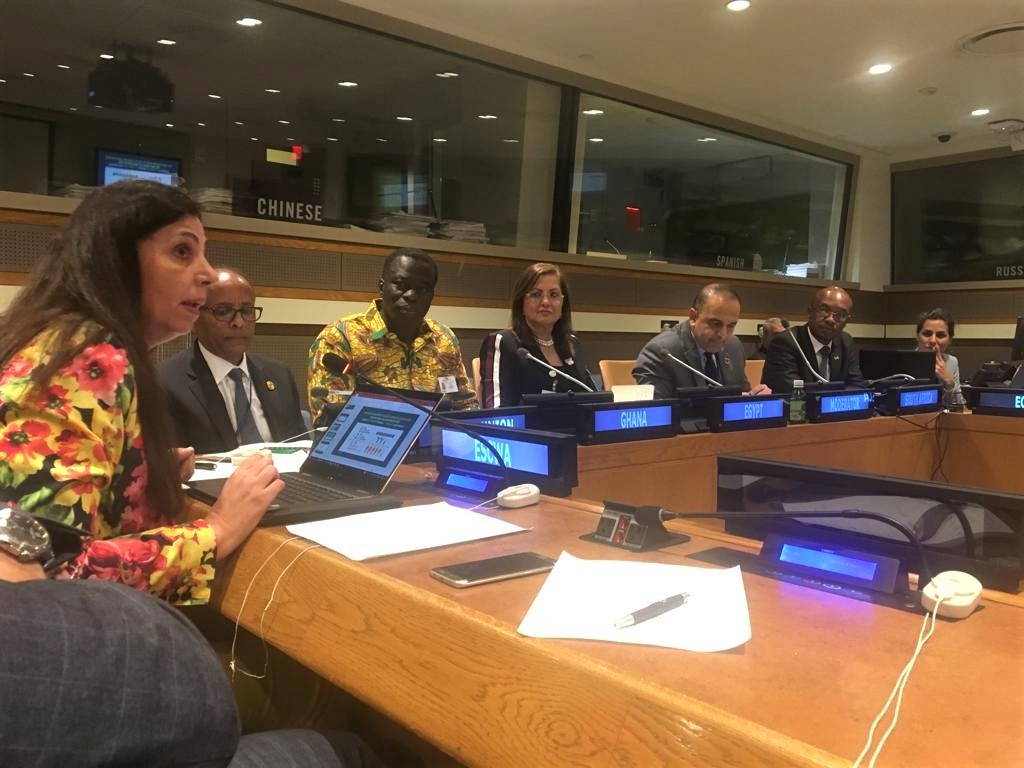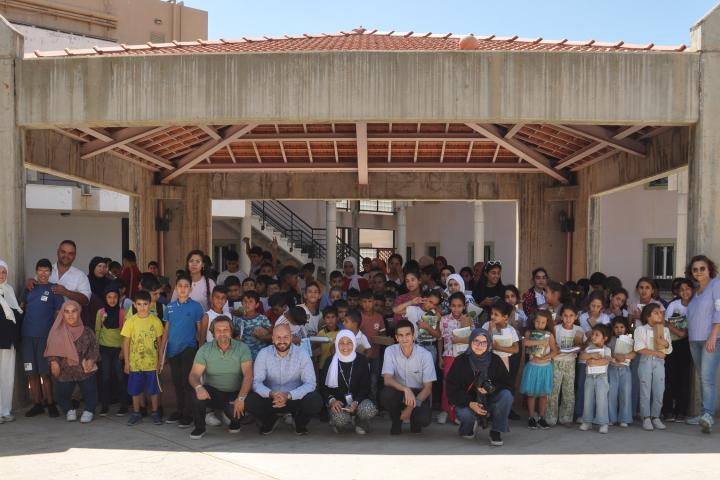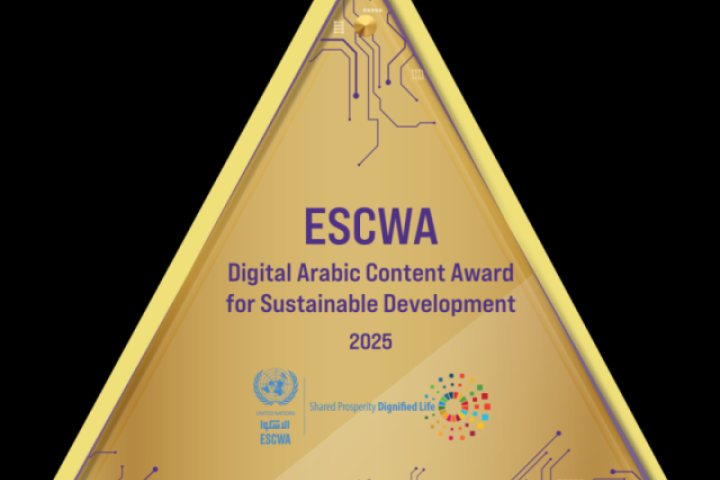Held under the auspices of the Economic and Social Council (ECOSOC) with the theme “Empowering people and ensuring inclusiveness and equality”, the 2019 HLPF, a UN central platform for follow-up and review of the 2030 Agenda and the Sustainable Development Goals (SDGs), welcomed hundreds of senior officials and decision-makers from 47 countries to take stock of where the world stands in terms of SDGs progress and identify challenges and gaps in their achievement.
The delegation of ESCWA was led by its Executive Secretary, Ms. Rola Dashti, as six Arab countries, including five of its member States, presented their Voluntary National Reviews (VNRs). Algeria, Iraq, Kuwait, Mauritania, Oman and Tunisia shared their respective experiences, success stories and lessons learned.
High-level Segment of ECOSOC
On the final day of HLPF, at the closure of the high-level segment of ECOSOC, Dashti highlighted two mega-trends affecting the implementation of 2030 Agenda. "The first is the risk of losing C-PED, i.e., losing our Commitment, Perseverance, Engagement and Determination towards achieving Agenda 2030,” she said.
"The second is the rise in conflict, and I mean social conflict arising from social injustice, economic conflict arising from inequality, technological divide, and economic deprivation, political conflict arising from lack of governance, restricted freedom and citizenship rights, and the most important human-nature conflict arising from air pollution, land and water misuse and mismanagement, and finally global conflict arising from undermining and attacking multilateralism and collective action," Dashti stated.
AFSD messages
The Iraqi delegation, led by Minister of Planning Nouri Al Dulaimi, and in its capacity as Chairman of the Arab Forum for Sustainable Development (AFSD) 2019, presented the final report of the Arab region, key recommendations of the Forum and the region priorities to empower people and ensure inclusiveness and equality.
This year, HLPF reviewed in depth SDGs related to good education, economic growth, reducing inequality, climate action, and promoting peaceful and inclusive societies, as well as strengthening partnerships.
ESCWA delegation took part in several sessions and side events, and held a series of bilateral meetings.
Climate action
During a plenary session on climate action, Dashti underscored that all Arab States are vulnerable to climate change which impacts social, economic and sustainable development in the region.
“Mitigation is important, but adaptation remains a priority for developing countries and particularly least developed countries which received only 2% of bilateral climate finance flows to the Arab region,” she said.
“Regional solutions are necessary to accelerate climate action based on national priorities, including through the Arab Centre for Climate Change Policies established at ESCWA by member States,” Dashti underpinned, while urging developed and developing countries to raise their ambitions and honour their commitments for climate action.
“Water scarcity and food insecurity are threatening our children’s lives and futures, especially in conflict-affected countries,” she said. “We need to give them hope and ensure that 2030 Agenda and Paris Agreement will not leave anyone behind,” she added while urging to stop counting development assistance and humanitarian aid as climate finance.
Messages from Arab young people
While at a ministerial luncheon focused on translating 2030 Agenda into national development realities, ESCWA Chief conveyed to attending ministers four messages from young Arab people.
She said: “Rakan, my nephew from Kuwait, says: I deserve to live in peace. Meanwhile, Manar, a 15-year old girl from Yemen, says: I do not want to go to school hungry or to be forced into marriage!”
Communicating the third and fourth messages, she read: “Mazen from Gaza, doing his homework every night at candlelight, sent a letter to his minister saying: ‘if you get me electricity at home, I will get better grades!’… And he did! Sama from Lebanon says: I don’t want to leave my family and country behind to find a decent job!”
Dashti concluded: “This is the region we live and work in, full of aspirations, and the passionate team of ESCWA works for Shared Prosperity and Dignified Lives, so that no one is left behind.
Inter-linkage of energy with other SDGs
At a side event on the interlinkage of energy with other SDGs, the Director of Sustainable Development and Policies Division at ESCWA, Ms. Roula Majdalani, said that access to energy in the Arab region is high but masks a number of inequalities between and within countries. “We need to put social justice on the agenda when we speak of energy,” she added.
Majdalani noted that Arab countries produce only 5% of CO2 emissions, globally, but pay a disproportionately higher cost as they suffer the impacts of climate change.
“The Arab region is seriously committed to renewable energy but countries have a need to maintain balance between mitigation and adaptation. Clean energy has to be part of the conversation!” she concluded.
Informal Sector
At a high-level debate on the Informal Sector and 2030 Agenda, Dashti noted that this sector represents more than 65% of the labour power in the ESCWA region causing more inequalities, which means that suitable innovative and inclusive solutions should be adopted to address this phenomenon.
She argued that there needs to be a major change in the mindset of governments in dealing with the informal sector. “Governments have to provide operators in the informal sector with the right incentives to support their growth and their capacity to generate wealth,” she suggested.
UN SDG Learn
As the United Nations Institute for Training and Research (UNITAR), the United Nations System Staff College (UNSSC) and their partners launched the UN SDG Learn platform, Dashti emphasized the importance of partnering with ESCWA in generating Arabic knowledge for and from the region. The platform offers SDG related courses and micro learning materials in multiple languages.
In addition to the HLPF, a Leaders’ Summit will be held under the auspices of the UN General Assembly on 24-25 September 2019 in New York. It will be the first UN summit on the SDGs since the adoption of the 2030 Agenda in September 2015.
***
For more information:
-Ms Rania Harb, Public Information Assistant, +961-70-008-879; email: harb1@un.org
-Ms Maryam Sleiman, Public Information Assistant, +9611978815, email: sleiman2@un.org




